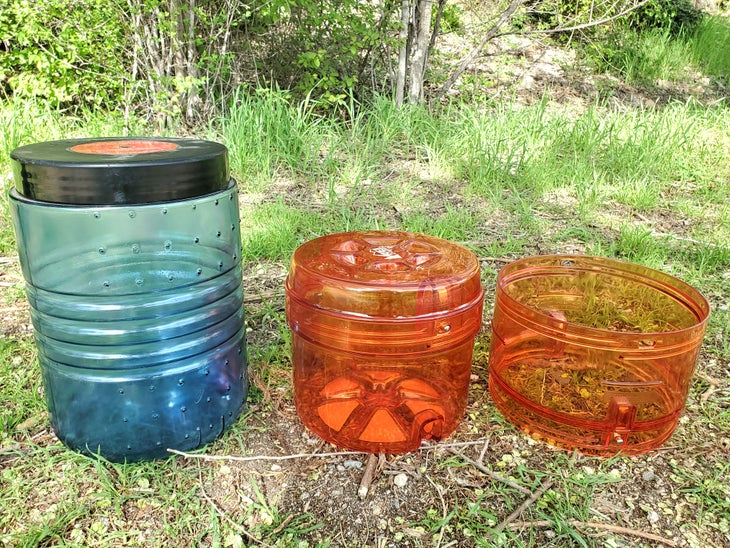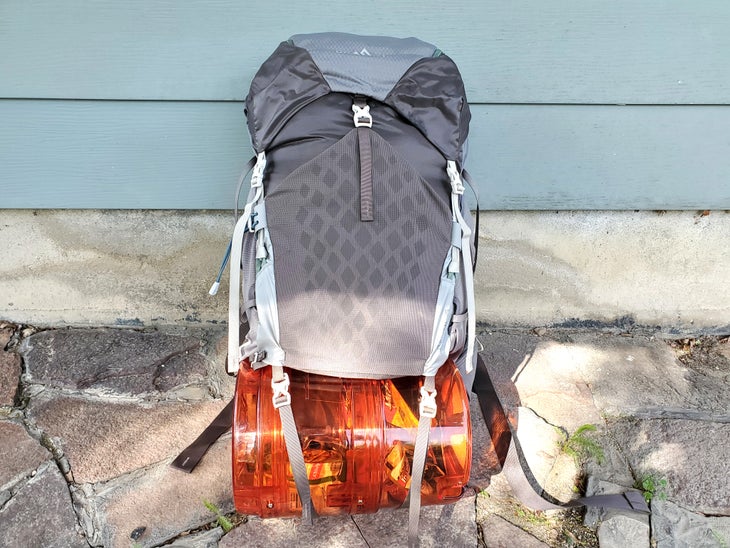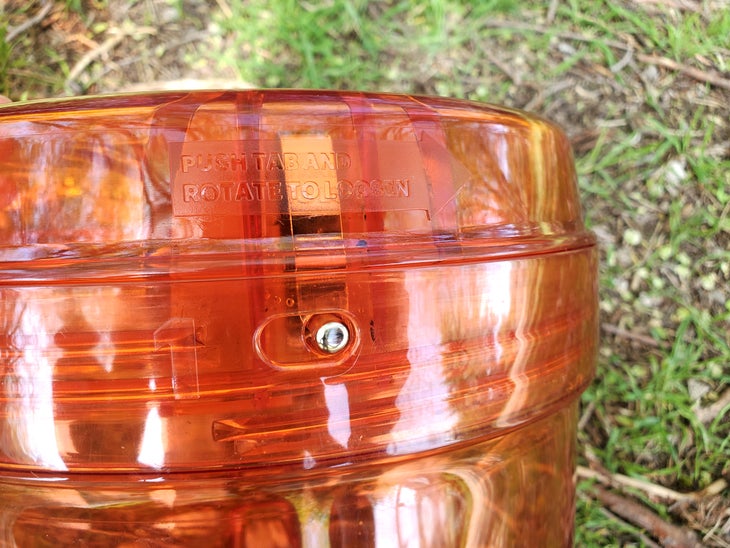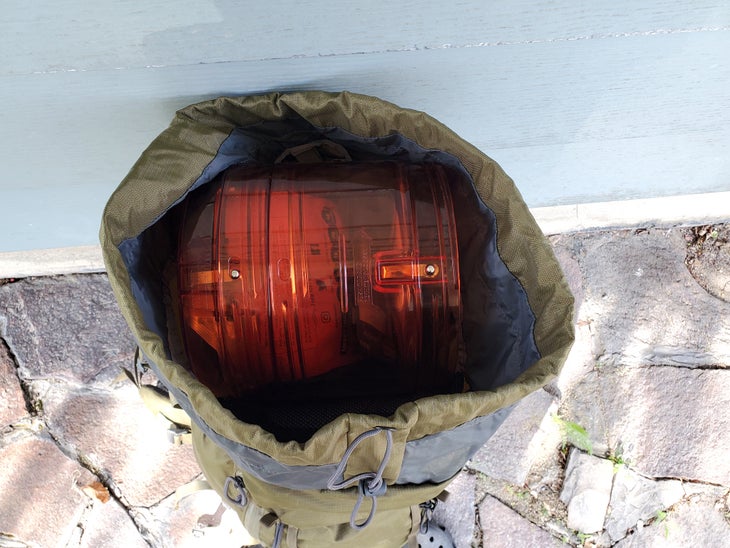Heading out the door? Read this article on the new Outside+ app available now on iOS devices for members! Download the app.
Bear canisters are an absolute necessity when they’re required on a trip, but options are few and far between. In general, BearVault canisters are the go-to choice for a reliable, inexpensive option, while Bearikade canisters shave off a few ounces with carbon fiber construction and a big increase in price. That’s why REI’s new bear canister, the Traverse, is so intriguing. Not only is it a new addition to a very short list of options, but it also promises to be the first modular bear can, as well as one of the cheapest options available at just $80. Here’s what we’ve found in our initial testing.

The Design
The Traverse is made entirely of polycarbonate, the same super-tough plastic that was originally used in Nalgene bottles. It has three sections, including a lid, a base, and a removable middle section. They lock into place with threads and a double tab mechanism, a system that seems totally secure, but does have a slight rattle thanks to the play that’s inherent in the design. With the middle section in place, the Traverse measures about 9 by 13 inches, with a capacity of 11.25 liters. Removing the middle section reduces the size to 9 by 8 inches and the capacity to 6.75 liters. In its smaller configuration, the canister can also nest inside the middle section, allowing users to downsize during a trip and gain some pack space back.
That modularity makes a big difference. Carrying a full-size bear canister is flat out annoying. Anyone who’s been on a multi-day trip knows the satisfaction of seeing your food bag shrink as the days pass, and having a bear canister that gets smaller as well is a serious upgrade. The modular design could be the difference between strapping the bear can awkwardly on the outside of your pack, or fitting it neatly inside. In its full-size setup, the Traverse is too large to fit horizontally in most 40-45 liter packs, though it does fit in several 50+ liter packs that we tested. But with the middle section removed, the canister has room for 3-4 days of food for a solo hiker and will fit in nearly any overnight pack.
Finally, it’s worth noting that the Traverse is approved as bear-resistant by the Interagency Grizzly Bear Committee, which means it’s accepted in most places that require bear canisters. However, it’s not currently approved for use in several areas along the Pacific Crest Trail that require canisters, like Yosemite and Kings Canyon. It’s likely that it will be approved for use at some point in the future, but for now, we can’t recommend the Traverse to PCT thru-hikers.

The Weight
The biggest downside to the Traverse is its weight. In its full-size configuration, it weighs in at 3 lbs, 9 oz. With the middle section removed, it weighs 2 lbs, 8 oz. That’s a full pound heavier than its competitors. It’s about the same size as the BearVault BV500, which tips the scales at 2 lbs 9 oz. The ultralight option, the Bearikade Blazer, is slightly larger but saves even more weight, at just 2 lbs, 1 oz.
Weight-conscious hikers would do well to buy a lighter full-size canister, even if it’s awkward to carry. Carrying a large bear canister on an ultralight pack isn’t fun, but there are ways to manage, like opting for a larger volume pack that fits a canister internally, or a purpose-built option like the Nunatak Bears Ears that’s designed around carrying a canister externally. For any ultralighter willing to spend hundreds of dollars to drop a few ounces in a tent or sleeping bag, the Traverse’s extra pound of weight is simply a non-starter. An ultralight bear canister might not be the most exciting upgrade, but there aren’t many purchases where you can save a pound for just $15, as you can by opting for the BearVault BV500 instead of the Traverse.

Usability
A big perk of the Traverse is the ease of use of its locking system, which we had no issue operating even in cold weather and with frigid digits. We never had to resort to using tools to open the container, as we do with other canisters (Bearikade cans require using something like a coin to open the screws on the lid, while the Bear Vault system can be finicky unless you have a credit card handy to help the tabs slide smoothly). The Traverse’s system includes two metal tabs on each threaded section, which have to be pushed and turned in the proper order (they’re numbered) before you can unscrew the canister. Cutouts on the base and lid give extra handholds during opening and closing. The tabs also have to be pushed in to fit under the lip on the canister when reattaching the lid, and they lock in place with a satisfying click once everything is screwed down. The process isn’t exactly easy—the tabs are a bit hard to access and require some force to operate—but most people shouldn’t have an issue using the Traverse. If you do have difficulty accessing the tabs, a key or pen could help you get into the small opening.
We found that keeping the threads free of dirt was fairly important when it comes to opening and closing the can. We tested it against sand, dirt, and mud, and found that any foreign material in the threads makes it tougher to open and close. However, we never got to the point where the tabs and threads wouldn’t operate—it just took a bit more elbow grease to get things moving. Still, for peace of mind, it’s worth wiping the threads down with a bandana before tightening everything into place if it’s dirty or dusty.

Who is the Traverse for?
The Traverse is a perfectly capable bear canister, even if the added weight is probably a non-starter for many hikers. The fact that it essentially serves as two cans in one for only $80 is by far its biggest perk. For most of us, a bear canister is a purchase of necessity more than anything, so an affordable bear can that’s suited for both overnight and weeklong trips is pretty appealing. The modular design is truly useful for shorter trips where lugging along a full-size bear can would be simply annoying, and buying two canisters from another brand would be far more expensive. A set of large and small cans from Bear Vault would run about $180, while two separate Bearikade cans would cost you north of $600. The bottom line: if the one-pound weight increase doesn’t scare you off, the Traverse can save you both money and space inside your pack.
